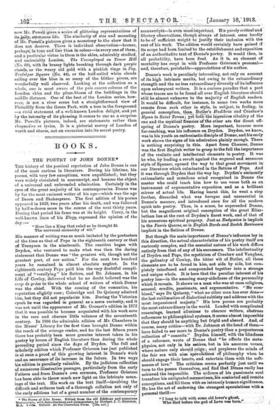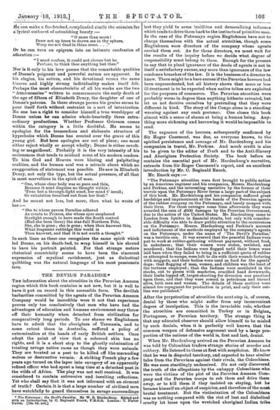"Here lies a King that ruled as he thought fit The universal monarchy of wit."
His manner of writing was as much imitated by the poetasters of the time as that of Pope in the eighteenth century or that of. Tennyson in the nineteenth. The reaction began with Dryden, who ventured to make what was then the daring statement that Donne was "the greatest wit, though not the greatest poet, of_ our nation." For the next two hundred years he remained in almost absolute neglect. In the eighteenth century Pepe paid him the very doubtful ccrmpliment 'of "versifying " his Satires, and Dr. Johnson, in his Life of Cowley, delivered what he no doubt believed was the coup de grace to the whole school of writers of which. Donne was the chief. With the coming of the romantics, his reputation slightly rose ; Coleridge and De Quincey admired him, but they did not popularite him. During the Victorian epoch he was regarded in general as a mere curiosity, and it was not until the appearance of Mr. Grosart's edition in 1872 that it was possible to become acquainted with his work save in the rare and obscure little volumes of the seventeenth century. In 1896 the admirable edition of Mr. Chambers in the Muses' Library for the first time brought Donne within the reach of the average reader, and for the last fifteen years there has probably been more genuine interest taken in his poetryby lovers of English literature than during the whole preceding period since the days of Dryden. The fall and scholarly edition which professor Grierson has just published is at once a proof of this growing interest in Donna's *ark and an assurance of its increase in the future. In two ways his edition is peculiarly valuable BY the judicious collection of numerous illustrative passages, particularly front the .early Fathers and from Bonus's own sermons, Professor Grierson has been able to throw much new light on the intricate meanings of the text. His work on the text itself—bite:flying the difficult and arduous task of a thorough collation not only of the early editions but of a great number of the contemporary
manusetipte—is even Moreirtiportnnt. critical and
literary observations, though always *of interest, seem hardly to be of sufficient weight te justify their inclusion ivith the rest of his Wei*. The edition *mild certainly hate gained if its scope had beenTimitedta the establishment and eiposition of an authoritatife teit of bonne's poetry. It would then, in all probability; hate been final. As it is, an element of mortality has erept in with Professor Grierson'e personal— and, therefore, perishable—appreciations of hie author.
Donne's work is peculiarly interesting, not only on account of ite high intrinsic merits, but owing to the extraordinary strength and the no less extraordinary diversity of its influence upon subsequent writers. It is a curious paradox that ii. poet whose traces are to be found all over English literature ehduld still be almost unknown to the majority of English readers. It would be difficult, for instance, to name two works More remote from each other in style in subject, in feeling, in general conception,. than Butler's Hudibicia. ñcI Crishated Hymn to Saint Teresa; yet teth–the ingenious ribaldry of the one and the inyitidal frenzied-of the other ate the.direct offspring of Donna's poetry. More. important, because more far-reaching, was his influence on Dryden. Dryden, we know, was in his youth an enthusiastic disciple of Donne, and his early work shows the signs of his admiration plainly enough. There is nothing eurprising in this. Apart from Chaucer, Donne was the first English writer to grasp to the full the importance of the realistic and intellectual elements in poetry. It was he who, by' leading a revolt against the angered and Sensuous style of Spenser, opened the way to that great Movement inour literature Which Culminated in the Satires of Pepe. And it was through Dryden that the *ay lay. Dryden's erninetitly rationalistic and mundane mind recognized in bonne the master who could teach him how to use verse both as an instrument of argumentative exposition and as a brilliant mirror of actual life. Having learnt this, he went a step further, discarded what was baroque and unessential in Donne's manner, and introduced once for all the modern spirit into poetry. Thus, in a sense, he superseded Donne, but the magnificent original conception of the great Elizabethan lies at the root of Dryden's finest work, and of that of his numerous spiritual progeny. Just as Endymion is implicit in the Faerie Queene, so is English Bards and Scotch Betiewers implicit in the Satires of Donne.
But though the main importanee Of influence lay in
this direction, the actual characteristic* of his poetry itself are curiously complex, and the essential nature of his work differs entirely from that of any of his successors. The intellectuality' of Dryden and Pope, the niyariciem of Crashatv and Vaughan, the gallantry of Cowley, the bitter wit of Butler, all the'se elements are to be found in him, not side by side, but completely interfused and compounded together into a strange and unique whole. It is here that the peculiar interest of his poetry lies—in the amazing many-sidedness of the personality which it reveals. It shows us a man who was at once religious, sensnal, etudite, passionate, and argumentative. "He combined," says De Quiteey, "what no other man has ever done-4 the last sublimation of dialeeticalsubtlety and address with the most impassioned majesty." His love poems are probably the most extraordinary in the world. Loaded with complicated reasonings; learned alltitionti to obscure Writers, abstruse references to philesophieal systems, it seems almost inipoceiblei that they should be anything but frigid and absurd. And, of course, many critics—with Dr. Johnson at the head of themn have failed to see more in benzie'd poetry than a preposterous collection of "conceits." bryden himself, With the blindness of a reformer, wrote of bonne that "lie affects the Metaphysics, not only in his satires, but in his amorous verses, where nature only should reign and perplexes the minds of the fair sex with nit* sgecurtitiOni of philosophy when he should engage their hearts, and entertain them with the soft
nesses of love." The criticism seems perfectly just until we turn to the poems themselves, and find that benne really has achieved the impossible. The ardours of his passionate soul transfuse his antiquated mennerignisibis contorted and:remete conceptions, and fill them with an intensely human significance. He has the art of endowing the strangest speculations with a pereottel thrill :- "I long to talk with totie old lover's&ea,
Who died before the.god of Lcons was born."__
fie 'can make a far-fetched, coMplicateel simile the odeasion-fist alyrical ontburst of astonishing beauty :—
"Ci room than nsoan!
Draw not up tenni to drown me in thy sphere, Weep me not dead in thine arms. . . . '
Or he Can turn an epigram into an intimate confession of adoratio-n "I must confess, it could not choose but be Profane, to think thee anything but thee."
Nor is it only in his love poems that the remarkable qualities of Donne's poignant and powerful nature are apparent. In his elegies, his satires, and his devotional verses the same bizarre. and highly strung individuality makes itself felt. Perhaps the most characteristic of all his works are the two " Anniversaries" written to commemorate the early death at the age of fifteen of Elizabeth Drury, the daughter of one of Donna's patrons. In these strange poems his genius seems to pour itself forth without restraint in a sort of intoxication. No one has, a right to consider himself_ a true worshipper of Donne unless he can admire whole-heartedly these extraordinary 'productions. Whether Professor Grierson comes within the category is a little doubtful. He seems to apologize for the tremendous and elaborate structure of hyperboles which Donne has erected over the grave of this young girl. But here apologies are Out of place ; one must either reject wholly or accept wholly; Donne is either revolting or magnificent. Probably it is the very intensity of his seriousness that tends to mislead some, of his modern readers. To him God and Heaven were blazing and palpitating realities, and the human soul was a miracle about which no exaggeration of statement was possible. He saw in Elizabeth Drury, not only the type, but the actual presence, of all that is most marvellous in the spirit of man.
"One, whose clear body was so pure and thin, Because it need disguise no thought within: 'Twas but a through-light scarf, her mind t' hiroll ;
Or exhalation breathed out from her Soul."
And he meant not less, but more, than what he wrote of her " She to whose person Paradise adhered
As courts to Princes, she whose eyes ensphered Starlight enough to have made the South control (Had she been there) the star-full Northern Pole, She, she is gone ; she is gone ; when thou knowest this, What fragment rubbidge this world is
Thou knowest, and that it is not worth a thought."
In such lines as these one recognizes the same spirit which led Donne, on his death-bed, to wrap himself in his shroud to have his portrait painted. For that strange nature rhetorical eccentricity seems to have been the sincerest expression of mystical ravishment, just as dialectical quibbling was the natural language of his most passionate lore.







































 Previous page
Previous page